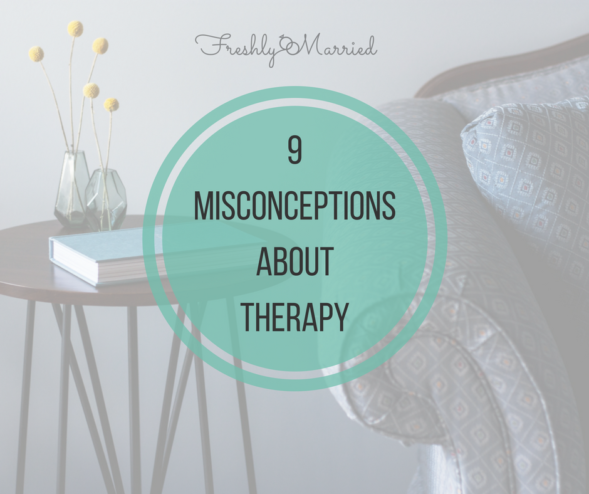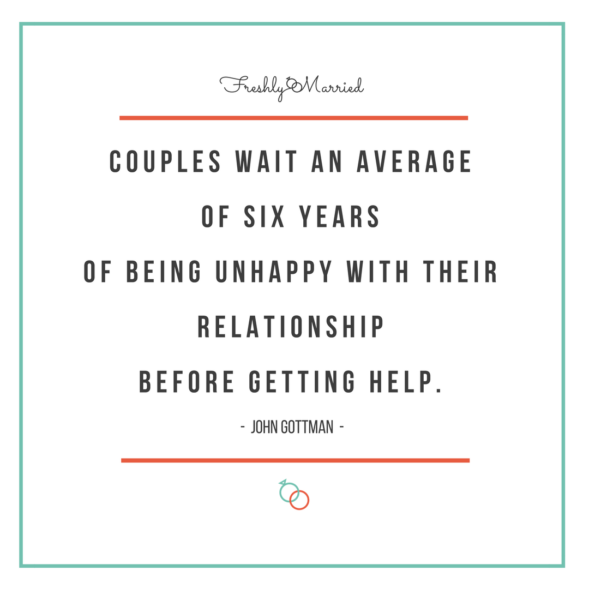9 Misconceptions About Therapy
By Amy Miller
To say there are so many stereotypes and stigmas out there associated with therapists and therapy is an understatement. Therapists are often portrayed in movies and TV shows as jokes, and I’m not sure why, because seeking help for your mental and emotional state of mind is not a casual or comical thing! It’s also just as important to keep yourself emotionally healthy as it is to keep yourself physically healthy! As someone in the marriage and family therapy field, I’m a huge believer and advocate of talking with someone either with a counselor or a therapist, but that’s probably because I know a whole lot about what truly happens, and have experienced it myself, as I wrote about here.
I think it’s because it seems like this big scary emotional area of life we hope we never have to encounter, and so we choose not to know a lot about it, which then opens the door to have it be viewed so negatively. SOOOO I want to provide a little more understanding about it by addressing some of the most common misconceptions about counseling and therapy!

“Therapy will cost me an arm and a leg.”
- Nope. It can be very affordable. If you check with your health insurance, most companies cover 100% of a 50 minute session with a $25 copay. Some therapists choose not to work with insurance companies, in which case it will be about $100 each session. More affordable options I know of are through community organizations that provide counseling for $5 to speak to grad school students working towards becoming a therapist. Also, when I went to school at Utah Valley University, they offered mental health counseling services to students for $10. So if you are still a student you can look into that.
“All a therapist does is ask, ‘And how does that make you feel?’”
- We all have seen this portrayed in movies and tv shows! A person is laying on a couch and the audience is getting annoyed because a therapist is just sitting with a notepad and pen asking only this to you and then writing a bunch of things down. I hate how therapy is portrayed like this and is viewed as a joke, because it’s not! Most therapists will actually ask specific questions like, “Why do you feel the need to _________?” and will teach you a concept or two each session.
“Once you start, you’ll be seeing them for life.”
- Though there are some people who really need lifelong therapy, a therapist usually doesn’t want to see you for longer than a year because you should see some progress after a certain point. Like I said above, I saw my therapist consistently for the first 3 months which is the average time. And then when we felt I had a handle on things I stopped and only came back every few months for “maintenance” basically.
“Seeing a therapist will interrupt my spiritual healing.”
- Sometimes it is nice to have a therapist who is the same religion as you, because they can understand your basic values, know the culture you are in, and be able to give you “homework” or suggestions that do not go against your religion. Also, sometimes your clergy will refer you to a counselor or therapist, and can work with them to help with your progression. Both my counselor and therapist were of my same religion as I was and I found that helpful the second time around. The first time around the perspective wasn’t as necessary.
“The therapist is just going to take my spouse’s side.”
- Some spouses walk out of their first session feeling like this and I’ll be honest, I think it’s because they just don’t like what the therapist has to say to them! A good therapist is there for the success of the two of you and even though one spouse might need more calling out than the other, they recognize that it takes two people to create a problem. If you are feeling like this, I highly suggest that you both see that therapist individually and then periodically see the therapist together. If you are CONVINCED that the therapist is deliberately taking a side, then go see a new therapist to get a second opinion.
“Therapy is only for people who are suicidal or freaking crazy.”
- In the blog post about couples therapy, I discuss some things that actor Bryan Cranston said about him and his wife going to couples therapy. One thing that he said in his original interview addressed this same misconception. He said: “For my father’s generation, as he literally said, ‘I’d rather stick needles in my eyes than go to a therapist. When I was a kid, if you heard of someone who went to a psychiatrist, it meant they were crazy. That’s the kind of labeling and judgment I was raised with. And I had to get rid of that." I love that even he recognized that this notion is sad.
- I believe therapy is for anyone at any point in their life! Whether they have been through traumatic things or just are looking for a better quality of life. In the difficult world we live in, with the difficult experiences we have all had individually or in our family, I think we would ALL be a lot happier if we all had a therapist! haha
“Therapy is only for couples who are ready to divorce.”
- While it is true that therapy is mainly for couples in crises, I believe there are important times a couple should consider seeking this professional kind of help. If the same issue keeps coming up several times for a couple, especially if it’s been going on for a few years, and the changes they have attempted haven’t been successful, it is absolutely worth having a therapist help work out that issue with you two! Wouldn’t you rather have this worked out now instead of having resentment build for years and years until it drives you to therapy anyways? :)
“No one I know sees a therapist.”
- I think therapy is more common than we think it is. Out of my close friends, a third of them have told me they have seen a therapist either on their own or with their spouse at some point in the past two years. And those are just the friends who have told me about it. AND IT’S OK! I think it’s fantastic, actually! My love for them just deepens from it!
“Seeing a therapist is embarrassing.”
- It doesn’t matter what anyone else thinks! Your marriage matters most, and if counseling can help make that happier, why NOT go?! And here’s a kicker too: I think many couples feel the desire that seeing a therapist could help them, yet they choose to let the stigma keep them from going. As friends, family, and society, we need to stop making fun of the idea of seeing a therapist. The more we joke about it, or negatively refer to it, the less likely couples are to seek professional help with their issues, and (I’m sure) the more likely they will be to separate. And honestly, I love people MORE for telling me they see a therapist together or individually! To me, it shows strength and humility, and I almost feel relieved because I know they are being taken care of.
- Also, I actually feel embarrassed FOR spouses who are not willing to go to therapy individually or together when the circumstances call for it! When your relationship is truly unhappy and it’s starving for some hope, I see it as prideful and weak to not put full faith and full efforts into fixing it.

It makes me extremely sad to think about any ONE couple going six straight years of mostly unhappiness together, but knowing that MANY couples experience this makes my heart ache. Can you imagine what can happen in six years of having unresolved issues? The problem probably keeps coming up, gets worse, and the resentment just builds and builds until every aspect of your life together is afflicted because of your ill-feelings towards each other. That is why I wanted to enlighten people on the idea of therapy so that they feel less nervous to ask for help.
Choosing to go to therapy is not a light decision, whether it is for yourself or as a couple. It can feel alarming to your spouse, so it’s important to think a lot about it. I feel very strongly that if you are consistently having negative depressive feelings about a reoccurring situation in your life, and the things you’ve tried to overcome it aren’t working, then you should try talking with a therapist. I’ve already written three blog posts on how depression can affect your marriage, so go read those if this is something you’re concerned about.
In making the decision to get counseling for you or your marriage, I suggest you look at these four things: 1) the seriousness of the issue that keeps coming up, 2) your role in it, 3) the success of the attempts to work at it from both spouses, and 4) the mental health of one of you, or both of you.
If you want some courage in taking the step towards going to couples therapy, read about this celebrity’s experience with it.